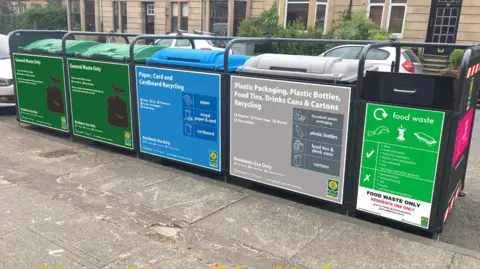New bin hubs with rat traps to be rolled out
 Glasgow City Council
Glasgow City CouncilUp to 1,200 new bin hubs are to be rolled out across Glasgow after a contract worth almost £2.5m was approved by the council.
Glasgow City Council has been trialling the on-street hubs - which include rat traps - in three parts of the city and say the quality of recycling has improved.
The pilot project was aimed at finding new and better ways of collecting household waste from tenement flats in the city.
The purpose-built bin-hubs will be placed on the street at the front of properties, taking them out of the traditional back court areas.
Glasgow council said the new method of waste collection would expand the range of recycling options available to residents in tenements and flats.
So far, trials have taken place in Pollokshields, Haghill and Finnieston, with areas in the southwest of the city, such as Govan, Cardonald and Ibrox being considered as locations for the new hubs.
The pilot was initially started in the summer of 2023, with the aim of increasing collections and offering safer working environments for staff.
Unions have previously warned of a "severe health and safety crisis" for refuse workers due to back court areas being infested with rats.
'Interesting experience'
A report from the council said that the new on-street hubs would support waste and recycling servicing from "challenging" flats and help residents keep their back courts in better condition.
Street furniture firm Broxap has been awarded the contract and it is thought the new hubs could be on the streets by this spring.
The hubs can house up to four steel bins on wheels, each with a 1,280 litre capacity, and one food waste bin.
At a council meeting on Friday, Green Councillor Dan Hutchison said the trials for the new bins had been a "interesting experience."
He said: "If I'm honest, a lot of the apprehension beforehand has been settled, but there are a couple of things that have certainly been outstanding."
He said rat traps had not originally been put in the bins at the start of the trial.
A council official pointed out that the newly-purchased bins were specially-adapted and can have bait boxes installed if rodents have been spotted in the area.
Officials claimed that throughout the pilot they had minimal reports of rodents in connection with the bin hubs.
They said the hubs, and their surrounding areas, were serviced more frequently than bins stored in back courts, and as a result were kept cleaner.
At the council meeting, Mr Hutchison also pointed out that some people may have difficulty using the bins due to their lid size and design.
He said: "There's no foot opening so people who are smaller or disabled can't actually get their bins in properly."
When asked about the pilot, a council official said: "The quality of recycling we are getting from the bin hubs is a lot better than the quality that we get through the back courts, we see a lot of contamination through the back courts.
"We are still analysing that data at the moment which will help inform the roll-out in the rest of the city."
Additional reporting by Drew Sandelands, Local Democracy Reporting Service